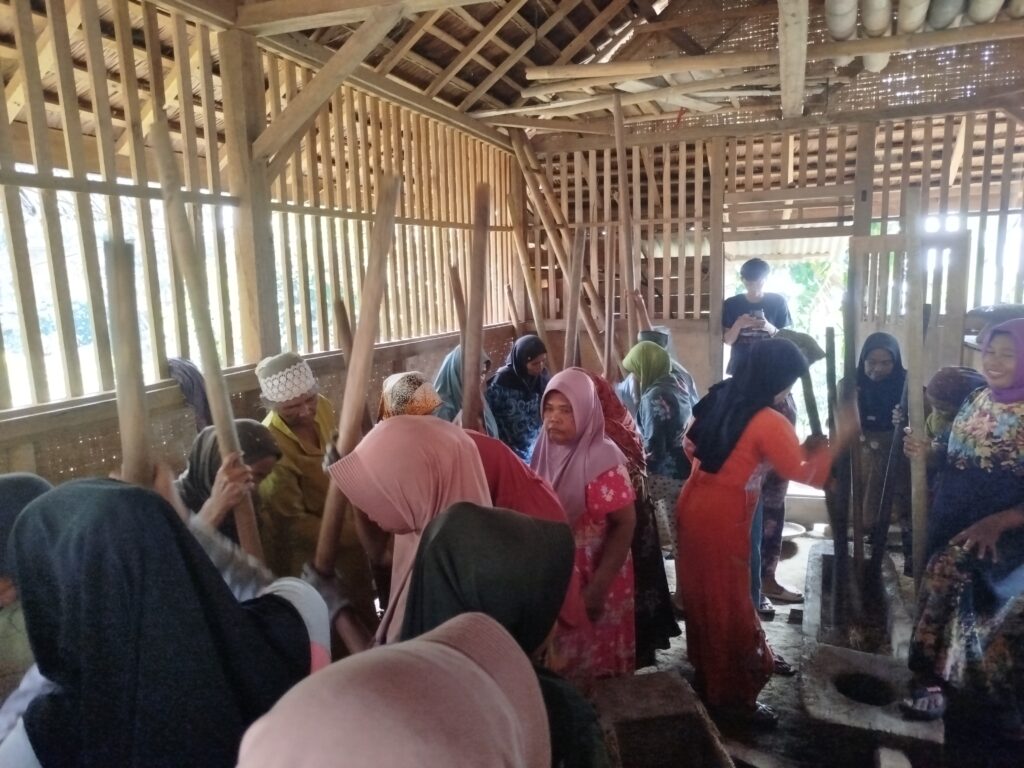That morning, a thin mist enveloped Pasir Eurih Village, a traditional settlement located at the foot of Mount Bongkok, Lebak Regency, Banten. This village is part of Kasepuhan, an indigenous community that lives in harmony with nature and maintains the traditions of their ancestors. The Kasepuhan Pasir Eurih area is dominated by mountains rich in biodiversity. This makes it an inseparable part of the Halimun Salak ecosystem. This customary forest is not only an ecological support, but also a source of life, culture, and spirituality for the community.
That morning, the cold atmosphere made us reluctant to move from our resting place. However, a rhythmic sound was heard from a distance—“Trang Treng Trong... Trang Treng Trong...”—stirred our curiosity. About 200 meters from where we were staying, we found a group of women, more than 20 of them, gathered in a hut (traditional hut) with high spirits. They are doing rthe enchantment. A tradition of pounding rice together that has been part of the lives of the Kasepuhan Pasir Eurih community for years.
The Repugan, in Sundanese, means working together or mutual cooperation. In Kasepuhan, this tradition is more than just a physical activity. It symbolizes the togetherness and social strength of women in maintaining and preserving local culture. This rice pounding activity is carried out in Saung Lisung, a traditional building that is specifically used to process rice into rice with traditional tools in the form of a pestle and mortar.
That morning, as many as 20 pocong (bunches) of rice were pounded by the women. One pocong of rice can produce 3 to 4 liters of rice. So in 3 to 4 hours, they managed to collect around 60 to 80 liters of rice. The rice produced is not just a daily food ingredient, but is used in various very sacred traditional rituals.
The Repugan is not a ritual in itself. But an important process in preparing food ingredients used to support the Seven Pillars, namely the seven stages of traditional farming based on ancestral teachings. These stages start from Water intake (clearing land in the forest) until Seren Taun (a thanksgiving ceremony for the harvest). Every food served in this ritual, such as rice, cakes, and other dishes, must be made from Pare Gede, a local rice variety that only grows in the Kasepuhan area.
However, what makes this tradition even more special is the customary rule that only women are allowed to pound the rice. This decision is not without reason. In the perspective of indigenous people, women are considered to have a strong connection with the cycle of life and fertility. Pounding rice by hand, without using machines, symbolizes respect for ancestors and nature.
Women in Kasepuhan do not only carry out traditional roles as food processors. But also as guardians of harmony between humans, nature, and spirituality. For them, pounding rice manually is not just a physical task, but a spiritual process that connects them with their ancestors and nature. Every pounding of the pestle on the mortar carries symbolic meanings about fertility, life, and balance.
Moreover, the involvement of women in tradition The Repugan shows how inclusive the culture in Kasepuhan is. Women of all ages and backgrounds come together, support each other, and strengthen social bonds between them. There is no distinction of social status in this tradition—all women have important roles and are valued. This tradition provides a space for them to learn, share, and strengthen women’s solidarity in the community.
In many agrarian cultures, women are often seen as the guardians of the earth and life, responsible for the survival of the earth through the cultivation of crops. In Kasepuhan, women play a central role in the agricultural process. Their involvement in the tradition The Repugan affirming their status as key holders of cultural sustainability.
Although Kasepuhan Pasir Eurih is located far from urban centers, they still feel the impact of modernization. One of the challenges faced is maintaining tradition amidst the flow of change. Rice grinding machines are now available, but the Kasepuhan indigenous people choose to continue pounding rice traditionally in order to maintain the authenticity and spiritual value of the food ingredients used in rituals.
For the Kasepuhan people, rice is not just food. It is a symbol of life, and the process of pounding it has a deep spiritual dimension. Pounding with a machine is thought to remove the “soul” of the rice, which in turn can affect the blessings of the ritual results. Therefore, even though there are easier and faster ways, they still maintain the traditional methods inherited from their ancestors.
In the midst of changing times, traditions such as Rempugan face various challenges. However, the spirit of women in Kasepuhan Pasir Eurih to maintain their ancestral heritage remains strong. With full dedication, they continue to carry out this tradition, ensuring that the cultural and spiritual values they hold dear are not lost in the face of modernization.
The initially cold and foggy morning in Kasepuhan Pasir Eurih ended with our admiration for the strength and spirit of the women who continue to maintain tradition. They are the guardians of life, the balance of nature, and the cultural heritage that has survived for centuries under the majestic shadow of Mount Bongkok and the expanse of the hills of the Halimun Salak ecosystem rich in biodiversity.
Tradition The Repugan not only a symbol of the continuity of customs, but also strong evidence of how Kasepuhan women play a role as guardians of nature and culture amidst the challenges of the times. They are the guardians of life, who with every pounding of the pestle, continue to instill hope and sustainability for future generations.


